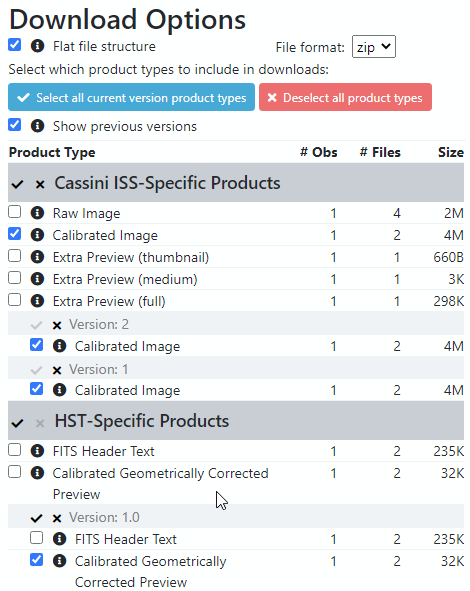Since our last update in March, we have been busy adding a number of behind-the-scenes features that will enable future development. But we've also added a few features that are useable right now! These include showing all of the available browse and preview products on the Detail tab, summarizing the number of results in collapsed categories on the Search tab, being able to download old product versions from the Cart tab, and retrieving metadata in various units through the API.
Multiple Browse and Preview Products
Many observations have multiple browse or preview products available. For example, Cassini CIRS observations often have body surface footprints and ring footprints. Occultations can have elevation angle graphs, ring footprints from different perspectives, and the occultation profile itself. Now when you view an observation on the Detail tab, you have the ability to scroll through all available browse and preview images. Just click on one of the arrows or the dots under the image, or use your keyboard's arrow keys, to change which image you are viewing.
OPUS has green "hinting" numbers that show you the number of results that you will get if you click on a checkbox during a search. However, previously when a category (like "Saturn" or "Uranus") was closed, you couldn't see whether there were any valid results under that category. OPUS now gives you the total number of results next to the category name, as well as the number of results for each checkbox as before.
Some PDS products have multiple versions. For example, an updated calibration pipeline may have caused the release of new calibrated products. OPUS has always allowed you to download old versions one at a time from the Detail tab:
but now old versions are also available for download directly from your Cart, allowing the download of groups of old products at once. Because most users only want the most recent product versions, old products are not shown by default, and clicking "Select all current version product types" will not select the old versions.
Metadata Units in the API
It is now possible to specify the desired units of metadata in the API. For example, if you want to get an observation's starting time as a Julian Date instead of the default YMDhms, you can ask for:
See the API Guide for detalis.
As always, we solicit your comments, feedback, and questions! If you haven't already, please join the opus-users mailing list. We promise not to spam you, but just to let you know when cool new features have been released.




No comments:
Post a Comment